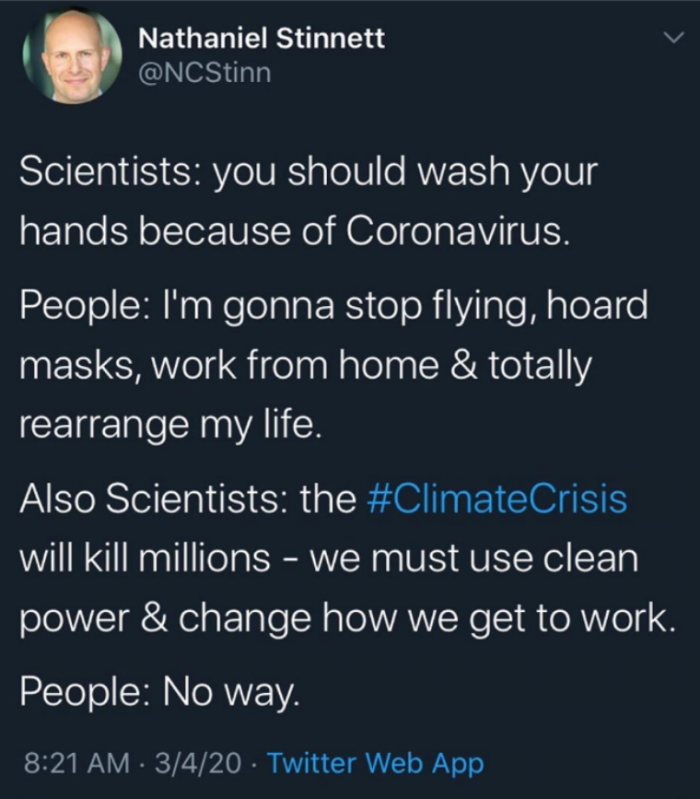The coronavirus is taking over the news, social media and for an increasing number of people, our lives.
I’ve been housebound for most of the last nine days. No, I don’t believe I have COVID-19; more likely, a cold. But I’ve viewed this as training for quarantine, and I’ve got to admit, I’m not a fan of the isolation.
Coming from the kind of introvert who requires very little social engagement, this is a huge statement. I desperately miss being outdoors, which makes up most of my “socializing.” And I also miss, with a touch of surprise, the few social activities I normally participate in. The yoga classes. The habitat restoration work parties. The various activist get-togethers. Coffee with a friend. Volunteering at the Humane Society. Inviting people for dinner.
I live less than two hours north of Seattle, the epicenter of the coronavirus outbreak in the U.S. My husband regularly travels to Seattle for work and describes it as eerily empty. The Womxn’s March scheduled for this month has been cancelled, due to the risk of spreading infection. The University of Washington shut down in-person classes for the rest of the quarter.
And while there have not yet been any coronavirus cases confirmed in my county, we’re taking similar precautions. A celebratory dinner hosted by a local nonprofit I volunteer with was cancelled. When people get together, they keep their distance.
Life in the time of coronavirus is quickly becoming one of isolation.
I wonder how long this will last and how deep the impacts will be, not only to public health and economics, but also, to mental health and relationships.
In a period of history when we need to come together in unprecedented ways, when community is what so many seek, this is one of the first things the coronavirus threatens.
How do we maintain and nurture community in a worldwide pandemic?
But this is only one of my questions.
For all the mind-blowing slowness of some world leaders — ok, mostly our leader — to adequately respond to the coronavirus outbreak, this is also the first time in my life I recall seeing people so rapidly responding to the threat and altering their lives accordingly.
It’s meme-worthy and awe-inspiring and relatable.
It’s also disheartening.
How many years have scientists been warning the public about the impending threat of climate change if we don’t make serious alterations to the way we live as human beings on this planet?
In the past several years, movements have emerged worldwide — Fridays for Future, This Is Zero Hour, Extinction Rebellion, Sunrise Movement, Youth Climate Strikes, to name a few — as siren calls for reform on behalf of the planet. Still, climate change is being hotly debated and close to one billion dollars are channeled each year into the investment of climate denial.
To see people so readily embrace the threat of the coronavirus, when the medical community is calling for preparation, not panic, and reject the more imminent threat of climate destruction is frustrating at best.
It suggests to me two things:
- Human beings only respond to things we consider “clear and present” dangers.
- People seem more concerned that the coronavirus will impact them personally, whereas climate change will impact “others.”
At this stage of knowledge about the coronavirus, we’ve been told that most healthy people who get infected will recover. With regards to the climate crisis, every child alive today will experience its impacts, if they haven’t already, and many will suffer the effects physically, economically and psychologically in their lifetime.
Air quality is decreasing, meaning more children and young people will develop respiratory illnesses.
Water is becoming more polluted and droughts are spreading, meaning this natural resource is more limited and in need of protection.
Hectares of critical rainforest are being burned for the agricultural industry. Sheets of ice in the Antarctic are melting. Sea levels are rising, flooding islands and coastal communities now and far more so in the future.
Natural disasters are becoming more frequent and fierce. More species are threatened or on the brink of extinction, which weakens biodiversity and affects us all.
Fossil fuels are poisoning our water, turning ecosystems into wastelands, destroying Indigenous cultures and livelihoods, emitting reckless amounts of carbon dioxide, leaking methane and endangering species — yet governments continue to invest in expansions, at the backing of the people.
All this, and people continue to say, “Nah, that’s not happening.”
Perhaps the only thing the coronavirus and climate crisis have in common is this: they are both striking the most vulnerable, disadvantaged populations the hardest. People with already compromised health, less resources and no access to healthcare (or insurance) are the ones who are in the most danger of the coronavirus. Often times, these are people of color, immigrants, minorities and people living in poverty. The same could be said of the the ones most affected by the climate crisis.
I get why the coronavirus feels more imminent right now, why it’s hitting home with more urgency. It’s something to be taken seriously.
I just wish the world would treat our climate crisis as a pandemic. If we could mobilize, the way China managed to get an entire hospital built in 6 days, how much could we accomplish in our fight for the lives of us all on this one planet we have to call home?
If more people could comprehend that this is the biggest threat to their children’s or grandchildren’s lives, how would they rearrange their lives to prepare?
These are the questions that weigh heavily on my mind. I can’t answer them for anyone else, but I can ask them. I can ask you.
If you saw the climate crisis as the pandemic it is, how would you vote?
I know my answer.









Read 10 comments and reply